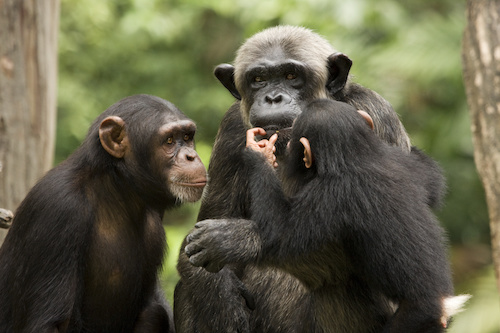 Culture & Ethics
Culture & Ethics
Chimps “Grieve” for a Lost Loved One, Just Like People?

This is really one for Wesley Smith, but I can’t resist. The BBC offers video proof that chimps “grieve” for their dead, just like people. And maybe they do. But from the highlights reel published online, I’m skeptical:
A unique, remarkable and intimate film may change the way we think about animals, and their ability to feel grief.
The newly-published film captures the solemn reactions of a group of chimpanzees who discover the dead body of a friend.
For 20 minutes, the chimpanzees quietly gather around their friend, despite offers of food to tempt them away. They gently touch and sniff his body, with chimps who were closer friends with the deceased appearing to be the most upset.
…
The incident occurred at the Chimfunshi Wildlife Orphanage Trust in the Copperbelt region of northwestern Zambia.
Chimps living here had been either rescued from the illegal wildlife trade years earlier, or born into the community since.
The ape that died was a 9-year-old chimpanzee known to human observers as Thomas.
Of course it’s another attempt to undermine our intuition that human beings are unique, including in our reactions to death. Grief over permanent loss, registered immediately upon viewing the body of a fallen comrade, implies an understanding of time and of relationships that I’m not sure chimps possess.
Some of the responses are curious. At one point, a “mourner” for the dead chimp, Thomas, approaches the loved one and flosses his teeth. A primatologist could no doubt shed light on this behavior. The film is reported and analyzed in the American Journal of Primatology (“Chimpanzees’ Responses to the Dead Body of a 9-Year-Old Group Member“).
But as an experiment, try this. First, watch the video as it’s presented. Then watch it again with the sound muted. You’ll notice a quiet but highly suggestive piano accompaniment. The credits at the end attribute the musical soundtrack to one Jason Rebello. The song is titled “Why Did She Go,” and it is described by its publisher, Audio Network Limited, as a “Slow and vulnerable piano solo.”
The chimps may be “vulnerable” too in the wake of their loss, but without the contribution of Mr. Rebello, intended to convey and evoke human emotions, the impression of “grieving” is greatly diminished.
Image credit: © shiruikage — stock.adobe.com.
